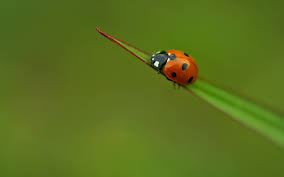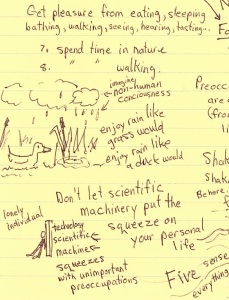Ever have one of those days? Everybody does. It’s a real bummer of a day (bummer is hippie speak for misfortune). It’s one of those days when you say to yourself, “Why me?” or “Why now?”
 You’re up before the sun “working in a coal mine, going down down,” and someone says, “Lord! I am soooo tired. How long can this go on?” Not that you actually work in a coal mine (unless you do). We’re talking metaphor. We all work in a coal mine of one kind or another. Even those who don’t work, work in a coal mine of a kind.
You’re up before the sun “working in a coal mine, going down down,” and someone says, “Lord! I am soooo tired. How long can this go on?” Not that you actually work in a coal mine (unless you do). We’re talking metaphor. We all work in a coal mine of one kind or another. Even those who don’t work, work in a coal mine of a kind.
It’s on a “one of those days” day that you look for a sign that there’s more to life. Not that you’re superstitious. It’s just that when life is boring, pointless and terrible, most of us look for a sign that there’s more to it. Even those who don’t believe in miracles look for them.
 But few people see signs these days and those who do are maligned. We might crave a vision but all we have is TV. It’s not because the signs aren’t there that we don’t see them.
But few people see signs these days and those who do are maligned. We might crave a vision but all we have is TV. It’s not because the signs aren’t there that we don’t see them.
We don’t see them because we’re either not paying attention or we lack imagination. It takes a special kind of sensitivity to subtlety for a person to see signs and put it together.
In 1989 two math professors wrote “Methods for Studying Coincidences” in which they outlined four sources for most coincidences: 1) a hidden cause, 2) the psychology of a person, including memory and perception, 3) multiplicity of endpoints, including the counting of “close” or nearly alike events as if they were identical, and 4) the law of truly large numbers – given enough events, almost any coincidence is bound to occur.
They found that most puzzling coincidences arise in the mind of the observer. Therein is the magic! That’s the answer! You alone see the sign! You create magic by tuning into it!

If you pay attention and if you lighten up and if you go for silly walks now and then you will become familiar with wonderful oddities (for complete instructions see: Ministry of Silly Walks) .
Call it coincidence. Call it ironic, moronic or divine. Call it just one of those things. Beyond rationalization, confabulation and logical explanation, there are times when weird things happen and you are in a perfect position to see them (see earlier post: “Enjoy What Is And Take What Comes“).

Let’s say you’re on your way to get your blood tested. As you peddle past a pretty storybook house with a fountain, you’re reminded of fairy-land pictures you’ve seen. The thought occurs to you that you and everyone you know will soon be dead.
It sounds gloomy, but at this moment it isn’t. Knowing that everything you know and have ever known will soon be gone has a way of putting things in perspective (see earlier post “Enjoy A Bad Day“).

What’s the worse case scenario in any situation? You could die. But you know that’s going to happen anyway so, as Dire Straits put it, “Why worry?”
 No sooner do you have this realization when you see a sign. But it isn’t the sign that catches your attention. It’s the sign spinner. Stopped at a streetlight, you watch the sign spinner. Suddenly life doesn’t seem so bad.
No sooner do you have this realization when you see a sign. But it isn’t the sign that catches your attention. It’s the sign spinner. Stopped at a streetlight, you watch the sign spinner. Suddenly life doesn’t seem so bad.
And you hear music coming from somewhere. It’s Tommy James and the Shondells singing Draggin’ the Line which goes: “Makin’ a livin’ the old, hard way. Takin’ and givin’ my day by day. / I dig snow and rain and the bright sunshine…/ My dog Sam eats purple flowers.
Ain’t got much, but what we got’s ours… / I feel fine!”
 What you thought was going to be “one of those days” changes into something beautiful when you open yourself to connection and possibility.
What you thought was going to be “one of those days” changes into something beautiful when you open yourself to connection and possibility.
 Jump forward: now you’re in a lab cubicle waiting for a nurse to take your blood. You’re listening to the Moody Blues sing “Tuesday Afternoon” and you think, “That’s funny. It is a Tuesday afternoon!”
Jump forward: now you’re in a lab cubicle waiting for a nurse to take your blood. You’re listening to the Moody Blues sing “Tuesday Afternoon” and you think, “That’s funny. It is a Tuesday afternoon!”
The nurse comes in and prepares the syringe. You avert your eyes and on the wall you see a picture of a fountain. It looks like the fountain you saw earlier by the storybook house that reminded you of pictures that you once saw of a fairyland of love. They say that fountains symbolize joy and peace and water is the sign of calmness. All you know is that you like water fountains.
You may look back on your life like a Dickens’ novel. Life seems planned but little accidental meetings and experiences turn out to be main features of the plot. At this minute, looking around at the world as you do, you suddenly have an insight.
You marvel at the wonder of life and in so doing, enjoy it.




 In observations of dwindling attention spans, machine-like thinking and disconnection from the garden, Carr points out how tools become part of us. Hold a hammer and your brain thinks it’s part of your hand. The more we use a tool, the more we mold ourselves around it.
In observations of dwindling attention spans, machine-like thinking and disconnection from the garden, Carr points out how tools become part of us. Hold a hammer and your brain thinks it’s part of your hand. The more we use a tool, the more we mold ourselves around it. As we extend ourselves artificially, we distance ourselves from natural functions. Like an industrialized farmer in a massive computerized machine who loses touch with the soil he serves, so too we lose touch with meaningful feelings found only in natural beauty.
As we extend ourselves artificially, we distance ourselves from natural functions. Like an industrialized farmer in a massive computerized machine who loses touch with the soil he serves, so too we lose touch with meaningful feelings found only in natural beauty.


 When you see that doing something about your situation is not going to help and not doing something is also not going to help, where are you? You’re nonplussed, as in “surprised and confused so much that they are unsure how to react” (Google). You are perplexed. Like a song and in bewilderment you are reduced to watching.
When you see that doing something about your situation is not going to help and not doing something is also not going to help, where are you? You’re nonplussed, as in “surprised and confused so much that they are unsure how to react” (Google). You are perplexed. Like a song and in bewilderment you are reduced to watching.
 People try to make themselves happy. When Judy Garland sang “
People try to make themselves happy. When Judy Garland sang “

 Think about how a rainbow appears. It’s your eye at the right angle combined with sunlight and water drops. Without you to see, a rainbow doesn’t appear. But a rainbow is more than light refraction. It isn’t a symbol. It has no reason for being. It’s light playing. It’s fun. It’s beauty.
Think about how a rainbow appears. It’s your eye at the right angle combined with sunlight and water drops. Without you to see, a rainbow doesn’t appear. But a rainbow is more than light refraction. It isn’t a symbol. It has no reason for being. It’s light playing. It’s fun. It’s beauty. Imagine yourself as a child. You are fed and content. Your world is not filtered by custom, interpretation, and analysis. The world is new. Imagine seeing a butterfly for the first time!
Imagine yourself as a child. You are fed and content. Your world is not filtered by custom, interpretation, and analysis. The world is new. Imagine seeing a butterfly for the first time! In
In  Even though we know what we should and shouldn’t do, something invariably happens to complicate simplicity and sour generosity. Irritation, frustration and sadness can shred good intentions.
Even though we know what we should and shouldn’t do, something invariably happens to complicate simplicity and sour generosity. Irritation, frustration and sadness can shred good intentions. By the end of the day we’re tired. We wind up flaked out on a chair, covered in cheesie dust. What went wrong? We tried, but therein is our problem. Who was the one trying? Was the spirit willing and the flesh weak? Remember Dr. Schwartz’s scientific dictum, “You are not your brain” (see:
By the end of the day we’re tired. We wind up flaked out on a chair, covered in cheesie dust. What went wrong? We tried, but therein is our problem. Who was the one trying? Was the spirit willing and the flesh weak? Remember Dr. Schwartz’s scientific dictum, “You are not your brain” (see:  Our brains can be like a Siren song luring us like sailors to shipwreck on a rocky coast. Thoughts become habitual through repeated pleasure-seeking and dopamine. Our heart may say, “No-no,” but our brain says, “Yes-yes!” Our brain often urges us to do what we probably shouldn’t.
Our brains can be like a Siren song luring us like sailors to shipwreck on a rocky coast. Thoughts become habitual through repeated pleasure-seeking and dopamine. Our heart may say, “No-no,” but our brain says, “Yes-yes!” Our brain often urges us to do what we probably shouldn’t. We may have more luxuries and conveniences thanks to the magic of technologies, but that doesn’t mean we’re happier. We’re busier. We now lack time to focus on things that produce a quieter happiness.
We may have more luxuries and conveniences thanks to the magic of technologies, but that doesn’t mean we’re happier. We’re busier. We now lack time to focus on things that produce a quieter happiness.

 Scientists can explain the mechanics of eyeballs: how they function and how to fix them, but in terms of perception – the link between world “out there” as taken in by eyeballs, and the mind’s interpretation of that world – science can’t say.
Scientists can explain the mechanics of eyeballs: how they function and how to fix them, but in terms of perception – the link between world “out there” as taken in by eyeballs, and the mind’s interpretation of that world – science can’t say. Think about what you see. As you walk, arms not swinging, looking at your feet, eyes glazed like donuts, imagine that you’re in a silent helicopter or a
Think about what you see. As you walk, arms not swinging, looking at your feet, eyes glazed like donuts, imagine that you’re in a silent helicopter or a 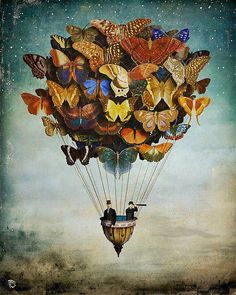 We each think of ourselves as a subject in a world of objects. We think we have an inner stream of consciousness that babbles, sometimes turbulent, sometimes calm, but are you in the stream, the stream itself or the one looking at the stream?
We each think of ourselves as a subject in a world of objects. We think we have an inner stream of consciousness that babbles, sometimes turbulent, sometimes calm, but are you in the stream, the stream itself or the one looking at the stream? Science tells us we perceive only reflected colours. Red is not “in” an apple. An apple reflects wavelengths that we see as red with our light receptors. Our eyes and brain together “translate light into colour” (
Science tells us we perceive only reflected colours. Red is not “in” an apple. An apple reflects wavelengths that we see as red with our light receptors. Our eyes and brain together “translate light into colour” ( There is a double vision between self and situation. Inside and outside are two sides of one coin. You see through a massive window, not as a thing inside. The world out there comes inside with each step you take forward.
There is a double vision between self and situation. Inside and outside are two sides of one coin. You see through a massive window, not as a thing inside. The world out there comes inside with each step you take forward. And, like a peeping fuzzy duckling, your life is nature’s music without notation.
And, like a peeping fuzzy duckling, your life is nature’s music without notation.

 Everyone in the room is well fed and has their own chair. Your chair is fantastic. There’s nothing quite like a good sit, when you’re in the mood for sitting. Above your head like a halo is a speaker. You hear a barely audible Al Martino sing
Everyone in the room is well fed and has their own chair. Your chair is fantastic. There’s nothing quite like a good sit, when you’re in the mood for sitting. Above your head like a halo is a speaker. You hear a barely audible Al Martino sing 

 You study each person and wonder: What’s it like to be another? Is another person’s feeling of awareness the same as your own? You think, “Yes,” but how do you know? Couldn’t you just as easily be someone else as you are yourself? If you were looking out of someone else’s eyes right now, how would you know? You can only see outward. You are always you to yourself.
You study each person and wonder: What’s it like to be another? Is another person’s feeling of awareness the same as your own? You think, “Yes,” but how do you know? Couldn’t you just as easily be someone else as you are yourself? If you were looking out of someone else’s eyes right now, how would you know? You can only see outward. You are always you to yourself. At the back of the room is a coffee urn and cups. You get up, fix yourself a cup and return to your chair. No one seems to care. No one knows who you are. Such is anonymity in the city. Everyone here is a name tag to each other.
At the back of the room is a coffee urn and cups. You get up, fix yourself a cup and return to your chair. No one seems to care. No one knows who you are. Such is anonymity in the city. Everyone here is a name tag to each other.

 In the
In the  Could purposeless purpose be enjoyment itself? Is this a spiritual paradox grasped? You look around with your two eyes – aware of yourself as you are where you are – and see just as two eyes saw thousands of years ago and will see thousands of years from now.
Could purposeless purpose be enjoyment itself? Is this a spiritual paradox grasped? You look around with your two eyes – aware of yourself as you are where you are – and see just as two eyes saw thousands of years ago and will see thousands of years from now.

 They rattle on. “I’m really enjoying this car. Are you?” “I love it,” says the passenger.
They rattle on. “I’m really enjoying this car. Are you?” “I love it,” says the passenger.

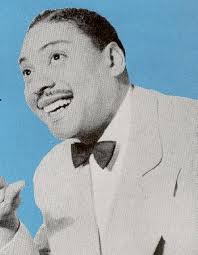
 It’s like what Chris Rock said in Comedians in Cars when Jerry asked him what he thought of a car. Chris Rock said, “I like you Jerry… everything is about the company … If we were in a cab, we would probably be having the same exact conversation.”
It’s like what Chris Rock said in Comedians in Cars when Jerry asked him what he thought of a car. Chris Rock said, “I like you Jerry… everything is about the company … If we were in a cab, we would probably be having the same exact conversation.”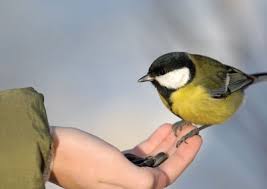

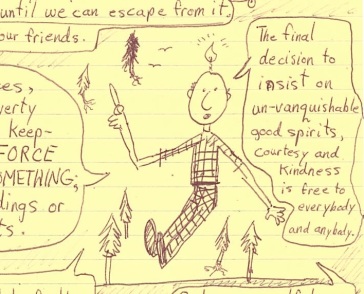




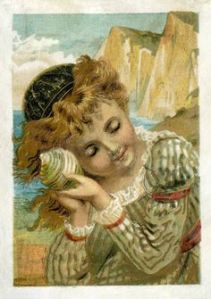




 A philosopher of enjoyment memorizes
A philosopher of enjoyment memorizes  Question anyone on a busy street anywhere in the world and ask: “How are you?” The reply could very well be, “I’m busy like everybody.” It’s the mantra of modernity. “Busy, busy” is said as humanity hives the world, but to complain is ineffectual, not to mention, unenjoyable.
Question anyone on a busy street anywhere in the world and ask: “How are you?” The reply could very well be, “I’m busy like everybody.” It’s the mantra of modernity. “Busy, busy” is said as humanity hives the world, but to complain is ineffectual, not to mention, unenjoyable.

 No doubt you’ll get strange looks. You might get reported for statue behaviour. Serious people will think you’re odd, but who cares? Odd numbers are not divisible by two. If you’re an odd number, you’re alone, but this is your secret power. If you can endure the loneliness, you are home wherever you are.
No doubt you’ll get strange looks. You might get reported for statue behaviour. Serious people will think you’re odd, but who cares? Odd numbers are not divisible by two. If you’re an odd number, you’re alone, but this is your secret power. If you can endure the loneliness, you are home wherever you are.

 To not do isn’t a lull between doings. You can be not doing and look busy. To not be busy is to take the time to watch something far away. It is to linger on a sensory memory (see
To not do isn’t a lull between doings. You can be not doing and look busy. To not be busy is to take the time to watch something far away. It is to linger on a sensory memory (see  Have you ever felt dull? The kind of dull that washes away beauty? Most people have. Some people have.
Have you ever felt dull? The kind of dull that washes away beauty? Most people have. Some people have. Moments of unhappiness come when we don’t notice anything outside ourselves. We get into a vicious circle of immediate thoughts and practicalities.
Moments of unhappiness come when we don’t notice anything outside ourselves. We get into a vicious circle of immediate thoughts and practicalities.